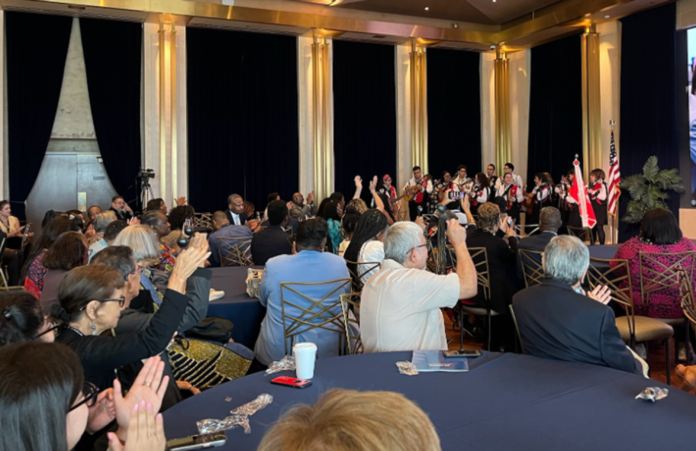During the Latino convening, leaders talked about the struggles their communities in the U.S. and Puerto Rico are facing. “The reality is that right now we’re suffering a lot,” said Sister Norma Pimentel, executive director of Catholic Charities of the Rio Grande Valley, in Spanish.
Because of immigration arrests, families with mixed immigration statuses are afraid to pick up their children from school or go to work, church and the supermarket. Historic flooding in the valley in late March wiped out everything some families had, Pimentel said.
With Texas Attorney General Ken Paxton launching investigations into migrant ministries, fear of legal consequences is also something “paralyzing the community,” Pimentel said, emphasizing that nonetheless, “ Catholic Charities is here to help those that need us.”
Felipe Salinas, who has worked in youth ministry, higher education and fundraising in the Rio Grande Valley, said the Rio Grande Valley Food Bank currently serves 80,000 to 85,000 people a week, but U.S. Department of Agriculture cuts that went into effect a few months ago “affected the food bank’s ability to get fresh fruits and vegetables.”
Now facing down cuts to SNAP, “in order for the food bank to make up the difference, there would need to be two and a half food banks,” he said.
Ada Laureano Carrasquillo, a pastor of a Caguas, Puerto Rico, church and a professor of health and nutrition at Universidad Ana G. Méndez, told the group in Spanish that many shared a common history living on land acquired from Spain in Puerto Rico, Texas, California and Arizona. “We are war trophies,” she said, noting that the U.S., rather than save the island from Spain’s exploitation, imposed harsh taxes and hardships.
“It costs a lot to live on the island. It costs a lot to feed yourself on the island. Our people are facing hunger, and they’re living with poverty,” said the pastor and professor, choking up. “We need help,” she said through tears.

The costume of a member of the University of Puerto Rico tuna, Monday, June 9, 2025, at Museum of the Bible in Washington. (RNS photo/Aleja Hertzler-McCain)
Puerto Rico receives food assistance not through SNAP, but the Nutrition Assistance Program. Unlike SNAP funding, which is tied to need, NAP has a fixed amount of funding through a block grant, which prevents the program from expanding when hunger rises.
The Latino gathering included a sizable contingent of students, including the members of the University of Puerto Rico’s tuna, a type of folkloric music group traditionally made up of students facing hunger who performed in exchange for food. Today, the University of Puerto Rico’s tuna honors that history by attaching spoons to members’ costumes and by partnering with campus organizations working on hunger.
Edithmarie Claudio, who directs the group, told RNS that attending the Latino convening made clear that Puerto Ricans “are not alone” in experiencing hunger. “Sometimes we think it only touches us as a country, but we are seeing it from another perspective here,” she said.
On Tuesday, the tuna performed at a major gathering of college students on Capitol Hill, who urged their lawmakers to address hunger on college campuses. Two-thirds of the 3.3 million college students eligible for SNAP benefits in 2020 were not receiving them, Bread for the World said, citing U.S. Government Accountability Office data.
Mya Bell became involved with Bread for the World through her work with her university’s food pantry at Purdue University Northwest. But attending Bread’s advocacy training taught her that “ instead of putting a Band-Aid on the issue of hunger, there’s work that’s being done to bring an end to it,” she said.
Bell, a Mexican and Macedonian American whose family received nutrition assistance and Medicaid, said she sometimes felt “helpless” growing up. “ Knowing that I went through something like that so I can uplift others that are going through something similar to me and carry on my story and the story of countless other people, it just feels like I’m following God’s plan for me,” she said.
This article originally appeared here.

